Finding the Best Boat Wax: Cutting Through the Hype
If you've ever stood in the aisle of a marine supply store or browsed online for boat wax, you know how overwhelming the options can be.
Flashy labels, bold promises, and countless "marine-grade" formulas leave many boat owners wondering: Does it really matter which boat wax I use? Or can I just grab some car wax from the garage and call it a day?
You're not alone in asking this. I’ve heard it time and time again from boat owners—
“Darren, I know my boat needs to be waxed, but I’m confused by all the products. Is there actually a difference between car wax and boat wax?”
And it’s a fair question.
While it might seem like a clever shortcut to use car wax on a boat, the reality is that boats face a very different environment than cars—sun, salt, constant water exposure, and harsh UV rays take a toll on gelcoat and fiberglass surfaces in ways a car’s clear coat will never experience.
That’s where a true boat wax steps in. —often labeled as marine wax.
These products are specially designed to bond to marine surfaces and provide long-lasting protection against oxidation, fading, and corrosion.
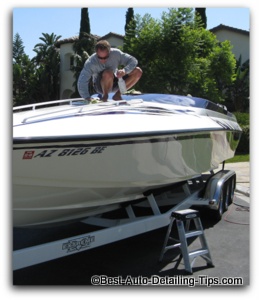
But let’s be honest—navigating the sea of boat care products isn’t easy. The marketing is slick (pun intended), and not every product delivers on its promises. That’s why I’ve taken the guesswork out of it.
After years of hands-on experience and testing countless products on a variety of boats, I’ve narrowed it down to the top-performing waxes that actually work—products that protect, shine, and truly earn their place on your shelf.
So whether you're a seasoned boat owner or new to marine maintenance, follow along as I share my top picks for the best boat wax options available today.
The Best Boat Wax is More Than Just Wax
Let me be a voice of reason in the sea of marketing hype—because the truth is, most boat owners don’t fully understand the nature of their boat’s surface.
More specifically, they don’t understand gelcoat.
And if you don’t understand gelcoat, you’re setting yourself up for disappointment when it comes to waxing, no matter how "premium" the product claims to be.
Gelcoat is the glossy outer layer of your boat’s fiberglass hull—the surface you’ll be applying any boat wax to. While it’s extremely durable and resilient, it has one serious weakness: oxidation.
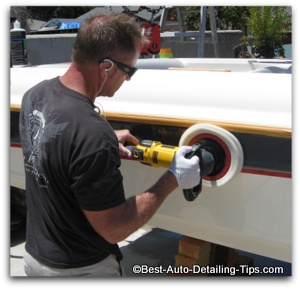
This process dulls your boat’s surface over time, and here's the tricky part—even newer boats with plenty of shine often have early-stage oxidation you can't see until you start waxing. Then suddenly, you're frustrated. The shine is patchy, inconsistent, and no matter how much you buff, the finish just won’t look right.
This is where many boaters go wrong. They buy into the promises on the label—durability, high gloss, easy application—and end up stuck in a cycle of over-waxing, underwhelming results, and disappointment.
You’ve probably got a mental checklist already: you want a boat wax that’s tough, not overpriced, easy to use, and leaves a great shine. Fair enough. But here's the deal...
The best boat wax isn’t just a wax. It’s a cleaner wax.
That means it contains added chemical cleaners or ultra-fine abrasives that remove surface oxidation while you wax. Whether your boat is fresh off the lot or has seen years on the water, you need a cleaner wax—period.
Because gelcoat may be tough, but oxidation is tougher. Without the cleaning component, you’re just sealing in oxidation and dullness, which leads to more work, less shine, and unrealistic expectations.
So before you dive into waxing, know this: if you skip the cleaning step, or use a wax that doesn’t do both jobs at once, you’ll likely find yourself waxing in circles—literally—chasing a shine that never fully appears.
That’s why, in every one of my recommendations, I focus on boat cleaner waxes—products that remove light oxidation, prep the surface, and protect all in one step. Now, let’s take a look at my top picks.
3M Light Cutting Polish + Wax
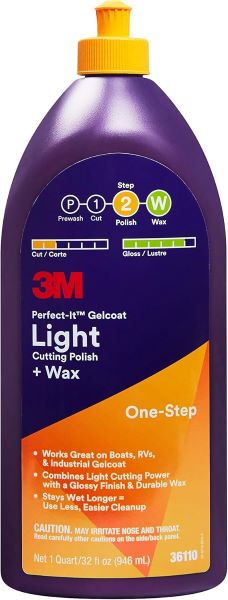
3M Perfect-it Polish and Wax on Amazon
Get pro-level results without the hassle—this polish-and-wax combo is designed to get you back on the water faster.
- Trusted by the Pros: Polishes and waxes gelcoat in one step, streamlining your detailing routine so you spend less time working and more time cruising.
- Formulated for Gelcoat & Fiberglass: Scientifically developed to remove light scratches, swirl marks, and minor surface defects on boats and RVs.
- Showroom Shine, Marine Tough: Leaves a professional-grade finish with a deep gloss and added protection from wind, water, and harsh weather.
- Effortless Application: Best used with a rotary polisher and a yellow 3M wool pad, but also applies easily by hand for touch-ups or tight spaces.
- Part of a Complete Care System: Ideal for light oxidation or as a follow-up to 3M Perfect-It Heavy Cutting Compound when dealing with more aggressive wear on darker gelcoat surfaces.
Meguiar's 1-Step Cleaner Wax

Meguiar's 1-Step Cleaner Wax on Amazon
Looking for a quick and effective way to bring your boat’s surface back to life? This all-in-one marine cleaner makes it effortless.
- One-Step Wonder: A non-abrasive formula that cleans, polishes, and protects your boat or RV’s fiberglass gel coat—all in a single, easy step.
- Light Defect Removal: Gently removes light oxidation, haze, fine scratches, and swirl marks without damaging the surface.
- Color & Gloss Revival: Packed with cleaning agents and polishing oils to restore deep color, shine, and gloss for a like-new finish.
- Lasting Marine Protection: Delivers tough, long-lasting defense against salt air, corrosion, and harsh UV rays.
- Use It Your Way: Whether by hand or with a DA polisher or rotary buffer, this formula is safe and effective—available in both 16 oz. and 1-gallon sizes for any job.
How to Wax Your Boat with a Cleaner Wax (Step-by-Step)
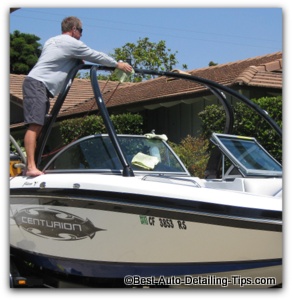
- Wash and Dry the Boat Thoroughly
Remove dirt, salt, and surface grime using a marine-safe boat soap. Rinse well and dry completely. -
Inspect the Surface
Look for areas with oxidation, dullness, water spots, or fine scratches to target with the cleaner wax. -
Choose Your Application Method
Decide whether you'll apply the wax by hand (foam or microfiber applicator pad) or with a machine polisher (DA or rotary with appropriate pad). -
Apply Cleaner Wax to Applicator or Pad
Use a small amount to start—a little goes a long way. -
Work in Manageable Sections
Apply wax in 2x2 ft areas using overlapping circular motions (by hand) or slow, controlled passes (with a machine). This ensures even coverage and consistent cleaning action. -
Let It Haze
Allow to dry to a light haze before buffing—check the product label for specific instructions. -
Buff to a Shine
Wipe away residue with a clean microfiber towel, flipping to a dry side for a final polish. If using a machine, switch to a clean finishing pad for buffing. -
Repeat as Needed
Continue section by section until the entire boat is done. Pay extra attention to oxidized areas—they may need a second pass. -
Final Inspection
Check the finish under natural light. Reapply wax to any dull or uneven areas for a uniform shine and protection.
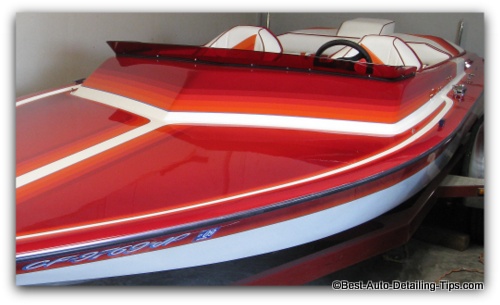
My hope is that you have become far more informed than before you found this page! I hope I have succeeded!
Sincerely,
Darren Priest
|
|

